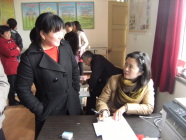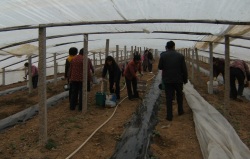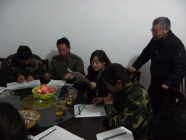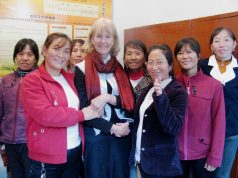Shaanxi Women’s Federation project “Establish Model Cooperatives in Two Districts of Shaanxi Province, China”

This two year project has now completed its first year of implementation. In March 2012, Shandan Coop expert Liu Guozhong, and NZCFS’ Dave Bromwich spent a week conducting a mid-project evaluation.
Background to the project.
The project is aiming to achieve the following key outcomes:
(a)Eight cooperatives will be established to a high level of standard cooperatives, and act as models for further cooperative extension.
(b) A core of cooperative trainers or coaches will be trained in the two districts and project locations in aspects of cooperative development to mentor the development of the 8 model cooperatives, and assist with further extension downstream.
Project activity to date:
Project selection
In February 2011, Shaanxi Women’s Federation selected ten cooperatives in eight counties of Baoji and Hanzhong, and from these, the final eight to participate in the project were confirmed following a visit by Shandan coop trainers Liu Guozhong and Chen Zhinian in March 2011.
The selected coops are, from Baoji City:

1. Jinse Qinchuan Kiwifruit Cooperative in Meixian County;
2. Xinxing Crafts Cooperative, Yanjia Village, Nanzhai Town, Qianyang County;
3. Fengsheng Cucurbits and Vegetables Cooperative, Qishan County;
4. Forest Musk Deer Breeding Association, Fengxian County;
From Hanzhong City:
5. Gaokang Palm Products Cooperative, Nanzheng County;
6. Luye Cooperative for Chinese Medicinal Herbs, Nanzheng County;
7. Luhai Seedlings Reproduction and Operation Cooperative, Yangxian County;
8. Shunli Pig Breeding Cooperative, Lueyang County.
All of these cooperatives will have an opportunity to recieve an award for 2012 UN International Year of the Cooperative, to be jointly presented by NZCFS, Gungho and Shaanxi Women’s Federation
Training project coaches
• In late March, early April 2011, an initial training workshop was held. From the selected cooperative sites, Women’s Federation representatives from city, county and township level, persons in charge of agricultural economic management stations, and project cooperative leaders attended an initial cooperative training, which also included discussion on implementation of the project.
• In August 2011, an advanced training was held, followed by visits by project cooperative trainers to individual cooperatives, to mentor the loal coaches.

Cooperative development
• In the first year, the locally trained coaches made from 7 to 18 visits to their respective cooperatives to give ongoing support and training.
• The coop experts have visited each cooperative once.
• All coops have received a computer allowing internet access, and a printer from the project.
The Monitoring and Evaluation process and results
Results from the mid-project DLA show increase in capacity in all areas measured.

A comprehensive questionnaire especially designed for Gung Ho coop evaluation was presented to ten members from each coop. The 100 questions allow a quantitative assessment of member and leader understanding and satisfaction in the four major areas of strategic planning, governance and management, business management and financial management. Overall, an average increase in capacity from 0.71 to 0.85 has been measured from the baseline survey conducted at the beginning for the project.
The monitoring also checked a variety of records kept by the coop leaders and management teams, to ensure management processes were robust.
Some contact by the local trainers with other cooperatives in all counties (total 17) has been initiated to present the 8 selected cooperatives as models.
Activity for Year Two
A further visit is to be made by a cooperative expert to each cooperative, and a follow up workshop with coaches is planned. A selection of the best coaches will also make another field visit to a Gungho cooperative in Sichuan to enhance their ability to lead extension of the cooperative model in the future.
At the end of the project, a field study will be made to one of the model cooperatives to demonstrate the best outcomes of the project, and encourage extension of the model cooperatives approach.




